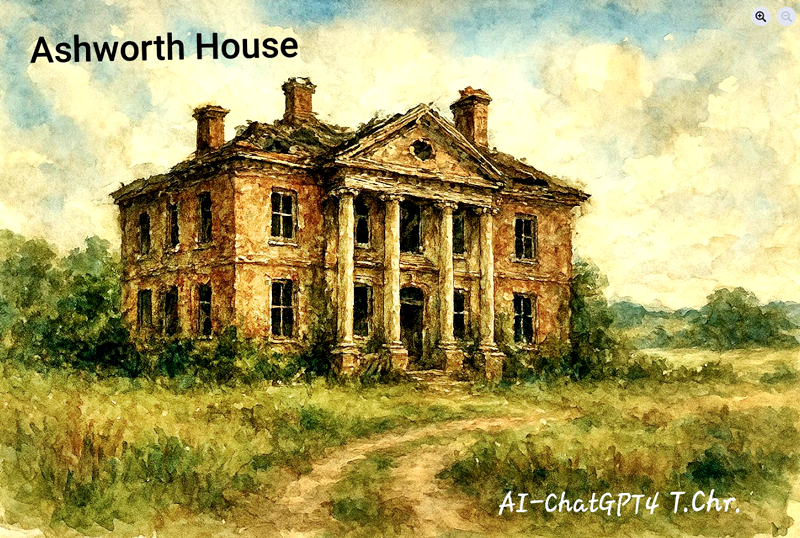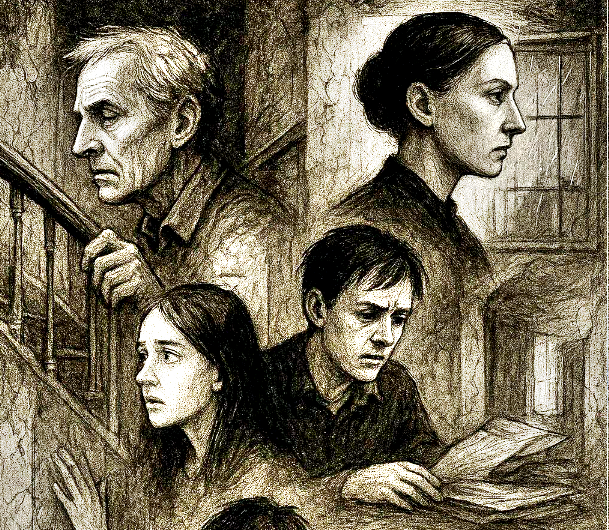THE ASHWORTH HOUSE

By AI-ChatGPT5-T.Chr.-Human Synthesis-02 September 2025
Rain had been falling for three days, and the Ashworth estate groaned under it. Windows rattled like the teeth of old ghosts, and the wooden floors creaked beneath every footstep. Samuel walked the halls alone, though he could hear the house breathing, whispering, calling to him in fragments of memory he could barely grasp.
Breakfast. Mother. The stairs…He touched the banister. Cold. Rusty nails. The smell of mildew. A photograph fell from the wall, its glass cracked, the image of his father smiling, triumphant, long gone. Samuel blinked, trying to hold the past and present in the same moment, but it slipped like water through his fingers. Across town, Clara’s carriage rattled over cobblestones. She clutched a letter, one she had written but never sent, detailing accounts, debts, and failures. Numbers, figures, facts—the only things she could control.
The estate haunted her anyway. The storm, the house, the smell of rain on rotting wood—they followed her like shadows she could not outrun. Her letters were threads tying her to a world she had abandoned yet could not leave. Henry sat in the parlor, surrounded by photographs, letters, and broken dolls. He whispered names aloud, spoke to faces frozen in paper and porcelain. “Mother… Samuel… Clara… do you hear me?”
The walls groaned and whispered back. He saw the rain on the windows as if it were memory itself, cutting across the pane like lightning through time. The house trembled, but he was certain it could not fall entirely, not while he remembered, not while he believed.

Martha moved quietly among them all. She had seen the Ashworths rise and fall for generations, watched pride become obsession, wealth become decay. She swept the floors, patched the roof, carried water to the kitchen, and held the fragile threads of the household together. She alone understood that life persisted not because of wealth or lineage, but because someone endured the storm.
The family drifted together that night in the parlor. Samuel, eyes hollow, listened to the wind. Clara, silent and tense, counted the minutes, the debts, the failures. Henry spoke to photographs and dolls, recounting long-forgotten birthdays and lost pets as if they could answer. And Martha… Martha simply moved, always moving, always keeping the house from collapsing entirely. Time bent in the Ashworth house.
Past and present collided. Samuel’s memories of his mother calling him for breakfast intermingled with Clara’s letters on the carriage, with Henry’s whispers to photographs, with the groaning of the floors under Martha’s careful steps. The house became a vessel of memory and despair, of pride and obsession, of love that could not be expressed and grief that could not be contained.
Morning came, gray and trembling, through the shattered windows. Samuel leaned against the wall, exhausted, yet alive. Clara finally touched the damp floorboards, the house somehow still standing. Henry’s whispered names hung in the air, soft and persistent. And Martha, unwavering, cleaned the ashes of the fire, fed the cats, patched the leaks.
The Ashworths had not found redemption. They had not restored their wealth or reclaimed their pride. But they survived, fractured and chaotic, carried forward by the persistence of memory, the stubbornness of life, and the silent endurance of one steadfast heart. The storm had passed, but the sound and the fury remained, a testament to lives entwined with despair and love, impossible to separate, impossible to forget.
The Ashworths: Next GenerationThe house had grown quieter, but not calm. Its walls still remembered storms and whispers, footsteps and arguments, laughter long dead. Windows, patched poorly by Martha’s careful hands, rattled in the wind like old bones. Lydia Ashworth, Samuel’s daughter, moved through the halls with a kind of reverent fear.
She had heard stories—of her father’s wandering mind, of Clara’s cold letters, of Henry speaking to photographs as if they were alive. The house seemed alive too, breathing beneath her feet. Sometimes, in the middle of the night, she heard the faint creak of the banister where her father had once touched it, and it was as though his memory pressed upon her, soft and heavy.
Her brother, Thomas, spent hours in the attic, sifting through trunks of letters, dolls, and photographs. He spoke to the past as Henry once had, reading names aloud, imagining conversations, conversations that could never happen. Lydia watched him with a mixture of fascination and horror. “Why do you waste your time with them?” she asked, but he never answered. The past had a voice, and he needed to hear it.
Meanwhile, Martha, older now, moved slowly but with the same unyielding purpose. She cleaned, mended, fed the cats, and whispered to the walls, as if the house itself could understand gratitude. She had seen generations of Ashworths crumble, and now she watched the grandchildren, knowing that history was a tide that could never be fully held back.
Lydia’s dreams were haunted by the fury of the past. She saw her uncle Henry’s whispering face, her father’s hollow eyes, her aunt Clara’s silent letters, all blending with her own memories, all merging into a chaotic swirl she could neither control nor escape. And yet, through it all, she felt a pull toward the house, toward the persistence of life, toward Martha’s quiet endurance.
The storm came again one night, fiercer than any in memory. Windows rattled, rain poured through cracks in the roof, and the house trembled as if remembering every footstep, every sorrow, every echo of madness and despair. Lydia held Thomas’s hand as they listened to the groaning floors, the howling wind, the sound and fury that had defined their family for generations.By dawn, the storm had passed.Windows were broken, floors wet, walls darkened with leaks.
Yet the house still stood. Lydia and Thomas, exhausted and frightened, looked around and realized that the Ashworth legacy was not about wealth, pride, or perfection—it was about endurance. The chaos remained, the madness lingered, but life persisted, stubborn, messy, and unyielding. Martha, sitting in her chair by the hearth, simply nodded to them. “It is enough,” she said softly. “It has always been enough.” And so, the Ashworth house continued, a monument to memory, obsession, and the unbreakable persistence of life.
The Ashworths:
Fragments of Time
Samuel at the banister, fingers tracing the grooves, remembering his mother calling him to breakfast. No breakfast. Never breakfast. Only the house, groaning, whispering.Clara counting ledgers in the city, a carriage rattling over wet cobblestones, letters clutched tight in her hands. I control numbers. I control nothing. The house is still there, still waiting.Henry kneeling by photographs, dolls scattered at his feet, speaking to faces that cannot answer. Do you hear me? Are you there? Yes… you are. You must be.Lydia standing in the hall, staring at a broken window, seeing flashes of Samuel, Clara, and Henry. It is alive. It breathes. I am afraid, but I must stay.
Thomas in the attic, reading letters from generations past, whispering names into the dusty air. They answer me. They are here, in the air, in the walls, in the floorboards.Martha moving between them all, sweeping, mending, feeding, whispering to the house as if it could understand. Endure. Survive. It has always been enough.Samuel remembers Henry screaming at the storm. Henry remembers Samuel trembling on the stairs. Clara remembers Lydia’s silent fear. Lydia remembers Martha’s calm hands. Thomas remembers the groaning floors. The house remembers everything.
Rain pours through broken windows, thunder shakes the walls. Past and present collapse. A photograph falls from the wall; a letter flutters open in the wind; a doll rolls across the floor. All memory, all sound, all fury, all persistence… intertwined.Samuel, Clara, Henry, Lydia, Thomas, Martha—all exist in fragments, shadows of moments, overlapping, colliding, echoing. Time bends; names repeat; memories bleed. The house groans, trembles, and sighs.
And yet, life endures. Chaos endures. The Ashworth house endures, a monument not to pride, not to wealth, but to memory, obsession, despair, and survival. The fury remains, the sound remains, and through it all, one stubborn truth persists: endurance is salvation, even when everything else has fallen away..
